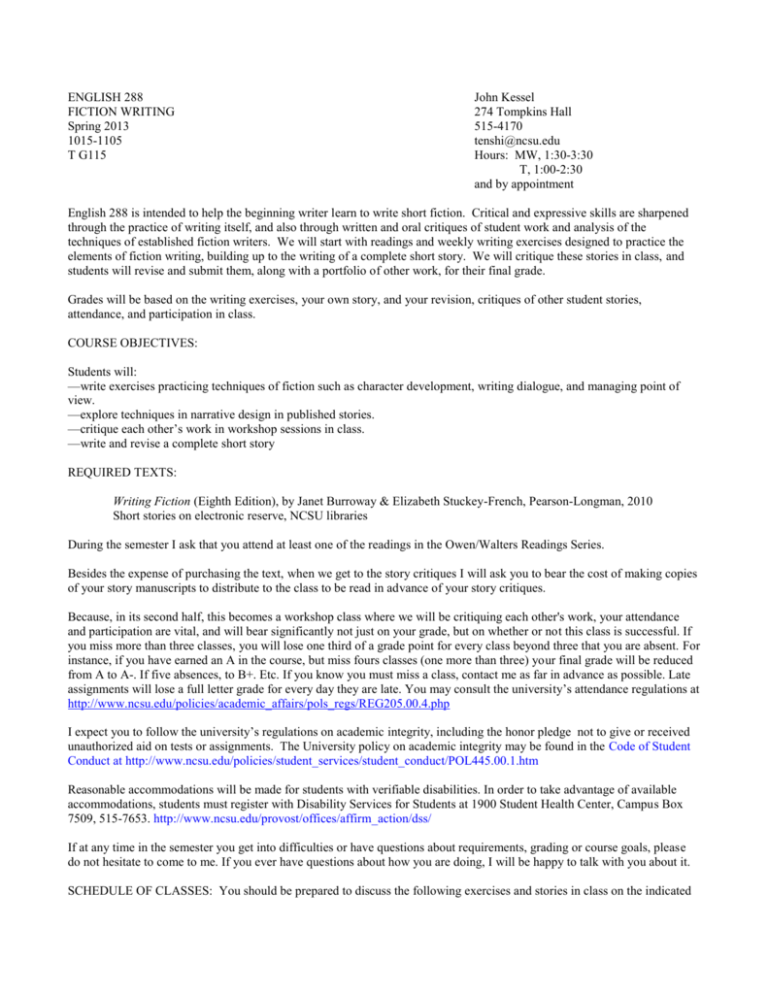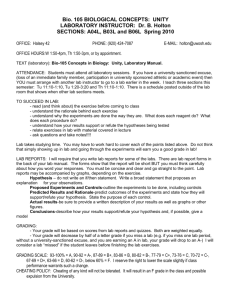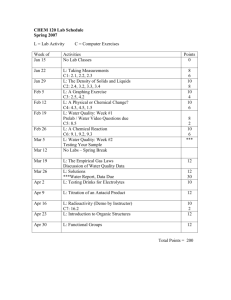
ENGLISH 288
FICTION WRITING
Spring 2013
1015-1105
T G115
John Kessel
274 Tompkins Hall
515-4170
tenshi@ncsu.edu
Hours: MW, 1:30-3:30
T, 1:00-2:30
and by appointment
English 288 is intended to help the beginning writer learn to write short fiction. Critical and expressive skills are sharpened
through the practice of writing itself, and also through written and oral critiques of student work and analysis of the
techniques of established fiction writers. We will start with readings and weekly writing exercises designed to practice the
elements of fiction writing, building up to the writing of a complete short story. We will critique these stories in class, and
students will revise and submit them, along with a portfolio of other work, for their final grade.
Grades will be based on the writing exercises, your own story, and your revision, critiques of other student stories,
attendance, and participation in class.
COURSE OBJECTIVES:
Students will:
—write exercises practicing techniques of fiction such as character development, writing dialogue, and managing point of
view.
—explore techniques in narrative design in published stories.
—critique each other’s work in workshop sessions in class.
—write and revise a complete short story
REQUIRED TEXTS:
Writing Fiction (Eighth Edition), by Janet Burroway & Elizabeth Stuckey-French, Pearson-Longman, 2010
Short stories on electronic reserve, NCSU libraries
During the semester I ask that you attend at least one of the readings in the Owen/Walters Readings Series.
Besides the expense of purchasing the text, when we get to the story critiques I will ask you to bear the cost of making copies
of your story manuscripts to distribute to the class to be read in advance of your story critiques.
Because, in its second half, this becomes a workshop class where we will be critiquing each other's work, your attendance
and participation are vital, and will bear significantly not just on your grade, but on whether or not this class is successful. If
you miss more than three classes, you will lose one third of a grade point for every class beyond three that you are absent. For
instance, if you have earned an A in the course, but miss fours classes (one more than three) your final grade will be reduced
from A to A-. If five absences, to B+. Etc. If you know you must miss a class, contact me as far in advance as possible. Late
assignments will lose a full letter grade for every day they are late. You may consult the university’s attendance regulations at
http://www.ncsu.edu/policies/academic_affairs/pols_regs/REG205.00.4.php
I expect you to follow the university’s regulations on academic integrity, including the honor pledge not to give or received
unauthorized aid on tests or assignments. The University policy on academic integrity may be found in the Code of Student
Conduct at http://www.ncsu.edu/policies/student_services/student_conduct/POL445.00.1.htm
Reasonable accommodations will be made for students with verifiable disabilities. In order to take advantage of available
accommodations, students must register with Disability Services for Students at 1900 Student Health Center, Campus Box
7509, 515-7653. http://www.ncsu.edu/provost/offices/affirm_action/dss/
If at any time in the semester you get into difficulties or have questions about requirements, grading or course goals, please
do not hesitate to come to me. If you ever have questions about how you are doing, I will be happy to talk with you about it.
SCHEDULE OF CLASSES: You should be prepared to discuss the following exercises and stories in class on the indicated
dates. We may not have time to discuss all the stories, but feel free at any time to ask questions about or make comments on
any work you've read. The schedule may be changed on short notice.
Every Friday until your stories are due this semester we will do in-class writing exercises, which you will either turn in at the
end of class or email to me by midnight on Friday. These exercises will not receive letter grades, but you will get credit for
turning them in and in total they will count for one third of your grade. Another third of your grade will be based on your
short story, and the final third on your story revision and your critiques and participation. Over the course of the semester, all
of you at one time or another will be asked to read your exercises aloud in class, after which we will discuss them.
Burroway
Stories
Jan 7: Introduction
Jan. 9-11: Chapter 1: The Writing Process
“The Poacher” by Ursula K. Le Guin (e-reserve)
Jan. 14: Chapter 2: Showing and Telling
“Big Me” by Dan Chaon
Jan. 16
“We Didn’t” by Stuart Dybek
Jan. 18:
“Powder” by Tobias Wolff (e-reserve)
Jan. 21:
MARTIN LUTHER KING HOLIDAY
Jan. 23: Chapter 3: Characterization I
“Fiesta 1980” by Junot Diaz
“Every Tongue Shall Confess” by ZZ Packer
Jan. 25:
“Following the Notes” by Pia Z. Erhardt
Jan 28-Feb 1: Chapter 4 Characterization II
“Mule Killers” by Lydia Peelle
Jan. 30:
“Bullet in the Brain” by Tobias Wolff
Feb. 1:
“Tandolfo the Great” by Richard Bausch
Feb. 4-8: Chapter 5: Fictional Place
“The Sea Fairies” by Maura Stanton
“Love and Hydrogen” by Jim Shepard
Feb. 8:
“A Visit of Charity” by Eudora Welty
Feb. 11-15: Chapter 6: Fictional Time
“Hominids” by Jill McCorkle
Feb. 13:
“Mrs. Dutta Writes a Letter” by Chitra Bannerjee Divakaruni
Feb. 15:
“Feelers” by John Gould
Feb 18-22: Chapter 7: Form, Plot, Structure
“What You Pawn I Will Redeem” by Sherman Alexie
Feb. 20:
“My Kid’s Dog” by Ron Hansen
Feb. 22:
“Everything That Rises Must Converge” by Flannery O’Connor
Feb. 25-Mar. 1: Chapter 8: Point of View
“Missing Women” by June Spence
Feb. 27:
“Who’s Irish” by Gish Jen
Mar. 1:
“Reply All” by Robin Hemley
Mar. 4-8:
SPRING BREAK
Mar. 11: Reading Day
“The Edge of the World” by Michael Swanwick (e-reserve)
“Say Yes” by Tobias Wolff (e-reserve)
Mar. 13: SHORT STORIES DUE
(enough copies for entire class)
“Out of All Them Bright Stars” by Nancy Kress (e-reserve)
Mar. 15:
two critiques
Mar. 18:
one critique
Mar. 20:
two critiques
Mar. 22:
Writing day: Dr. Kessel off campus
Mar. 25:
one critique
Mar. 27:
two critiques
Mar. 29:
SPRING HOLIDAY
Apr. 1:
one critique
Apr. 3:
two critiques
Apr. 5:
one critique
Apr. 8:
two critiques
Apr. 10:
one critique
Apr. 12:
two critiques
Apr. 15:
one critique
Apr. 17:
two critiques
Apr. 19:
Chapter 9: Revision
Notes on “Keith” by Ron Carlson
“Keith” by Ron Carlson
Apr. 22:
“Balancing the Equation” and
“Think Like a Dinosaur” by James Patrick Kelly
(ENG288 e-reserves, Kessel)
Apr. 24-26:
More on revision
Professional Practices & Wrap-up
Wednesday, May. 1: FINAL STORY REVISION & PORTFOLIO DUE










